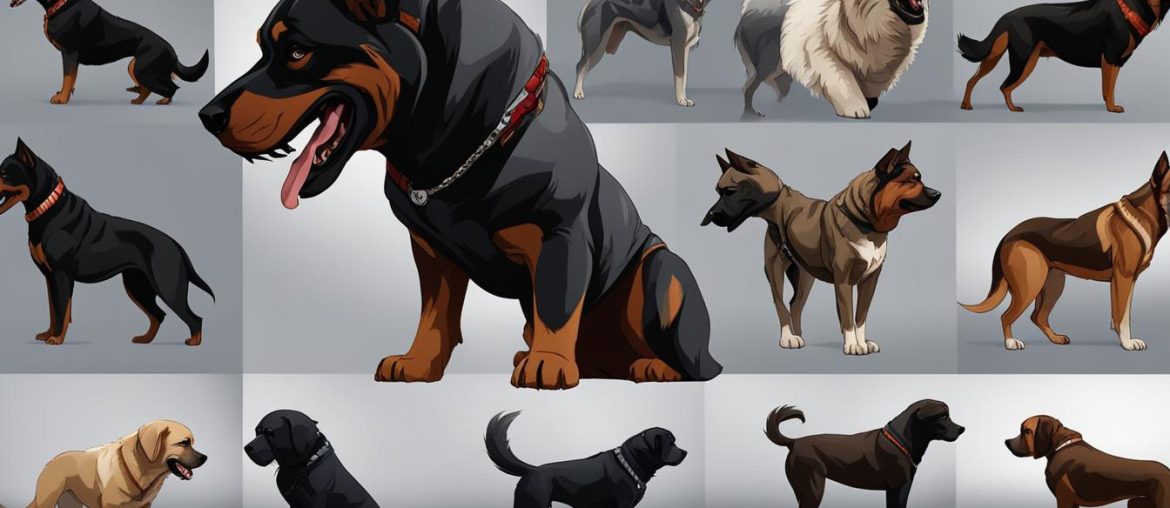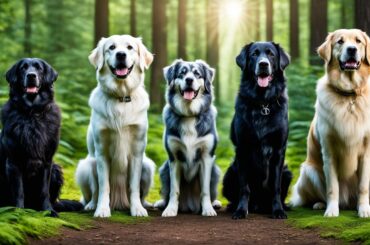In this article, I will be discussing the most aggressive dog breeds, a topic that is of great importance for potential dog owners. While dogs are often loving and protective, it is crucial to understand that some breeds have a higher tendency towards aggression. By gaining knowledge about these breeds, you can make informed decisions and ensure the well-being of both yourself and your furry companion.
Key Takeaways:
- Understanding aggression in dog breeds is vital for potential owners.
- Chihuahuas may be small, but they can exhibit aggressive behavior, especially towards strangers.
- Dachshunds are known for their stubbornness and feistiness, which may contribute to their aggressive tendencies.
- Chow Chows have dominant personalities and require early training to manage their aggression.
- Akitas possess a strong guarding instinct and require experienced handling to prevent aggression.
- American Pitbull Terriers can show tenacity and courage, leading to potential aggression, but with proper training, they can be loving pets.
Chihuahua – The Small and Aggressive Breed
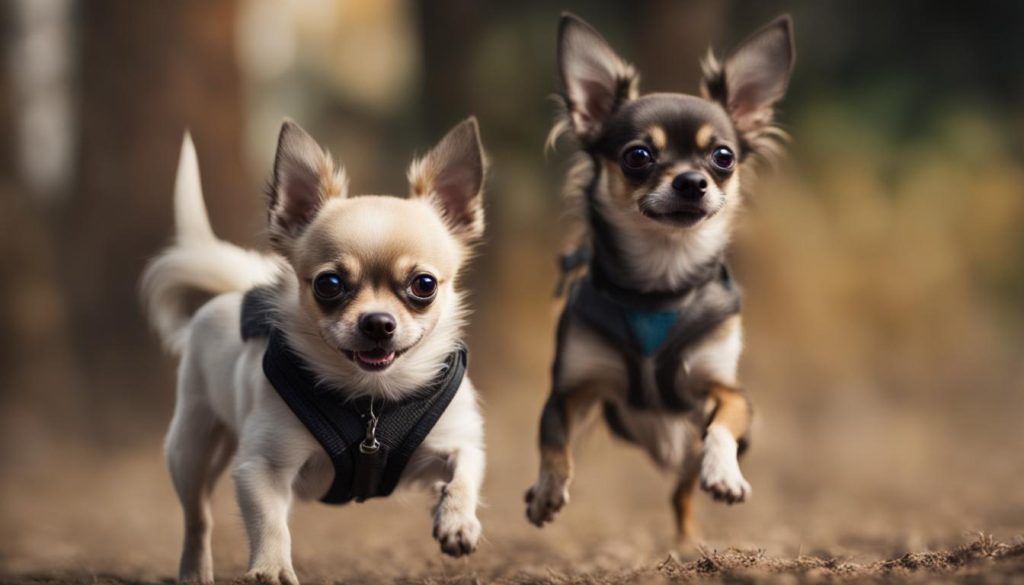
The Chihuahua is a small breed that is known for its aggressive behavior. Despite their tiny stature, Chihuahuas can display a fierce and protective nature, especially when it comes to their owners. This aggression often manifests as barking, growling, and even biting. It is important for potential dog owners to be aware of this breed’s aggressive tendencies and take the necessary steps to manage their behavior.
One of the primary factors that contribute to the Chihuahua’s aggressive behavior is their loyalty and devotion to their owners. While this loyalty is admirable, it can also lead to jealousy and possessiveness. Chihuahuas may become territorial and protective, particularly when they feel threatened or when strangers approach their owners.
To prevent aggression in Chihuahuas, proper training and socialization are crucial. Early socialization with other dogs and different environments can help them learn appropriate behaviors and minimize their aggressive tendencies. Consistent and positive reinforcement training methods should be employed to establish boundaries and teach them to respond to commands.
To summarize, Chihuahuas may be small in size, but they can exhibit aggressive behavior. Their loyalty and protective nature can sometimes lead to aggression, especially towards strangers. However, with proper training, socialization, and responsible ownership, Chihuahuas can be wonderful companions.
Dachshund – A Feisty and Stubborn Breed
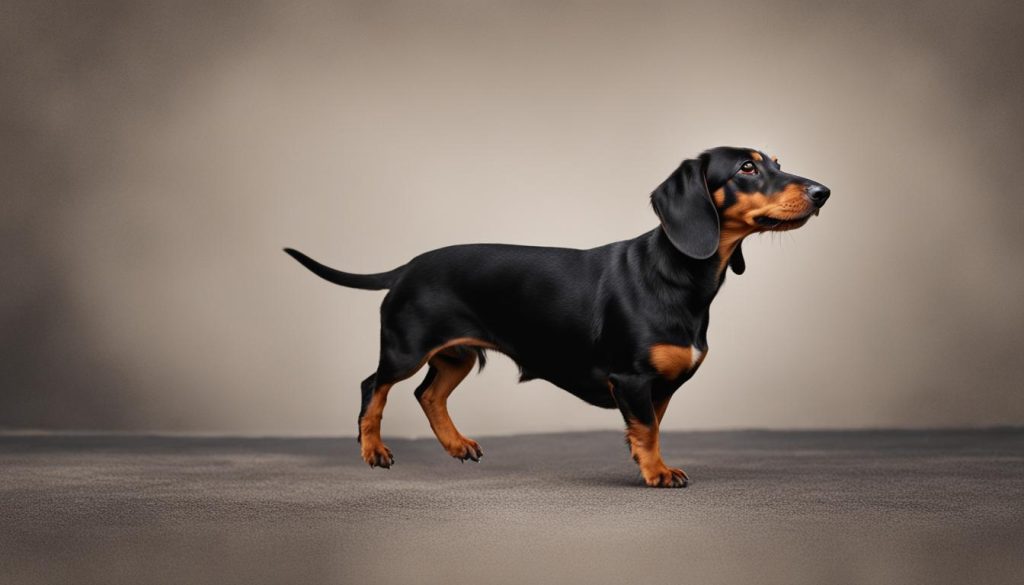
The Dachshund, also known as the Weiner dog, is a small breed with a big personality. These dogs are known for being feisty and stubborn, which can sometimes lead to aggressive behavior. It’s important for potential owners to understand the characteristics of Dachshunds to prevent any issues.
Dachshunds have a strong prey drive and may show aggression towards small animals or even other dogs. This instinct stems from their history as hunting dogs, where they were bred to chase and dig into burrows to catch prey. While this behavior is ingrained in their genetics, it can be managed through proper training and socialization.
Training a Dachshund requires patience, consistency, and positive reinforcement. These dogs respond well to reward-based training methods, where they are praised and rewarded for good behavior. Early socialization is also crucial to ensure they are comfortable around people and other animals.
Common Triggers for Aggression in Dachshunds
- Protectiveness over food or toys
- Feeling threatened or cornered
- Being territorial
- Lack of proper socialization
Dachshunds may also exhibit aggression as a result of fear or anxiety. It’s important to create a safe and calm environment for them, providing reassurance and positive experiences. Consulting with a professional dog trainer or behaviorist can also be beneficial in managing any aggression issues.
| Aggression Triggers | Management Techniques |
|---|---|
| Protectiveness over food or toys | Teach the “leave it” command, use puzzle toys for mental stimulation |
| Feeling threatened or cornered | Allow them space, avoid putting them in situations that make them uncomfortable |
| Being territorial | Establish boundaries and rules, gradually introduce new people or animals into their space |
| Lack of proper socialization | Expose them to a variety of environments, people, and animals from a young age |
By understanding the nature of Dachshunds and implementing proper training and socialization, their aggression can be effectively managed. With the right guidance, these feisty and stubborn dogs can become loving and well-behaved companions.
Chow Chow – A Sturdy and Dominant Breed
The Chow Chow is a breed known for its sturdy build and dominant personality. They have a distinct appearance with their thick double coat and lion-like mane. Historically, Chow Chows were used as hunting and guard dogs, which may have contributed to their aggressive tendencies. It is important for potential owners to understand the characteristics and behavior of Chow Chows to ensure proper training and socialization.
| Traits | Characteristics |
|---|---|
| Size | Medium to large |
| Temperament | Independent, aloof, protective |
| Aggression | Potential for aggression if not properly trained and socialized |
| Training | Requires a firm and consistent handler |
| Socialization | Early and ongoing socialization is crucial |
Chow Chows can be aloof and reserved with strangers, which may be perceived as aggressive behavior. They have a strong instinct to protect their family and territory, making them excellent guard dogs. However, this protective nature can manifest as aggression if not properly managed. It is essential for owners to establish clear boundaries and provide consistent training to prevent aggressive tendencies from developing.
Early socialization is also vital for Chow Chows to interact positively with other dogs and animals. Exposing them to various environments, people, and experiences at a young age can help mitigate their potential for aggression. Ongoing socialization throughout their lives will ensure that they remain well-adjusted and less prone to aggressive behavior.
Chow Chows are not recommended for first-time dog owners due to their dominant and independent nature. They require an experienced handler who can establish themselves as the pack leader and provide consistent guidance. With the right training and socialization, Chow Chows can be loyal and loving companions.
It is important to note that while Chow Chows have the potential for aggression, not all individuals will display aggressive behavior. Proper training, socialization, and responsible ownership are key to raising a well-behaved and balanced Chow Chow.
Akita – A Protective and Wary Breed
Akitas are a breed of dog known for their protective and wary nature. Originally from Japan, they were historically used as guard dogs and hunting companions. Akitas are large, powerful, and have a strong guarding instinct, making them one of the more aggressive dog breeds.
Their protective nature makes Akitas excellent family dogs, as they are fiercely loyal and will go to great lengths to protect their loved ones. However, this protective instinct can sometimes lead to aggression, especially towards strangers or other animals. It is important for Akita owners to provide proper training and socialization from an early age to manage their aggressive behavior.
Akitas require experienced handling due to their independent and dominant nature. They can be wary of unfamiliar people and situations, which can trigger their aggression if not properly managed. Early socialization is crucial to minimize aggressive tendencies and ensure that Akitas are well-adjusted and well-behaved members of the family.
| Characteristics | Aggression Level | Training Needs |
|---|---|---|
| Protective | High | Firm and consistent |
| Loyal | Moderate | Early socialization |
| Independent | Moderate | Experienced handling |
Akitas are incredibly loyal and protective dogs. While their aggression may pose challenges, they can be wonderful companions for responsible and experienced owners. It is crucial to understand their needs and provide proper training and socialization to ensure their aggression is managed effectively.
American Pitbull Terrier – Courageous and Tenacious
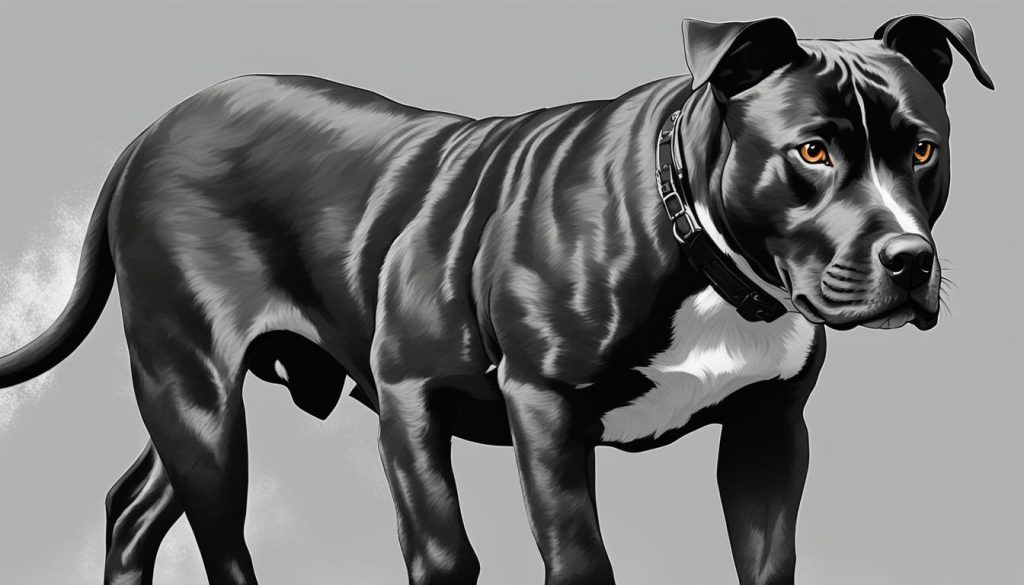
The American Pitbull Terrier is a breed known for its courage and tenacity. They are strong and athletic dogs with a natural instinct for protection. However, it is important to note that their reputation for aggression is often misunderstood. Like any other breed, their behavior is largely influenced by their upbringing and environment.
It is essential for owners to provide proper training and socialization from an early age to ensure that their Pitbull Terrier grows up to be a well-rounded and balanced dog. This includes exposing them to various people, animals, and environments to prevent fear-based aggression and promote positive social interactions.
With the right guidance and care, American Pitbull Terriers can be loving and loyal family pets. It is important to remember that responsible ownership is key to managing any potential aggression. This includes providing them with regular exercise, mental stimulation, and a consistent routine. By meeting their physical and emotional needs, owners can help prevent any unwanted aggressive behaviors from developing.
The Importance of Responsible Ownership
As with any dog breed, it is crucial for owners of American Pitbull Terriers to be aware of their responsibilities. This includes educating themselves about the breed’s characteristics, exercising proper control, and ensuring the safety of both their pet and others.
Responsible ownership also means understanding and complying with local laws and regulations regarding aggressive dog breeds. It is important to follow leash laws, keep your Pitbull Terrier properly contained within your property, and take appropriate precautions when in public spaces.
By being a responsible owner, you can help break the negative stereotypes surrounding the American Pitbull Terrier and promote a better understanding of these loyal and loving dogs.
Table: American Pitbull Terrier Characteristics
| Traits | Description |
|---|---|
| Strength and Stamina | American Pitbull Terriers are incredibly strong and have high endurance levels. |
| Loyalty | They are fiercely loyal to their families and can be protective of their loved ones. |
| Intelligence | Pitbull Terriers are highly intelligent and can excel in various activities and training. |
| Playfulness | They have a playful nature and enjoy engaging in physical activities. |
| Socialization Needs | Early socialization is crucial to ensure that Pitbull Terriers are well-adjusted and friendly towards other animals and people. |
| Training Requirements | Consistent training methods, positive reinforcement, and patience are necessary to teach Pitbull Terriers good behavior and manners. |
Cane Corso – A Powerful and Unfriendly Breed
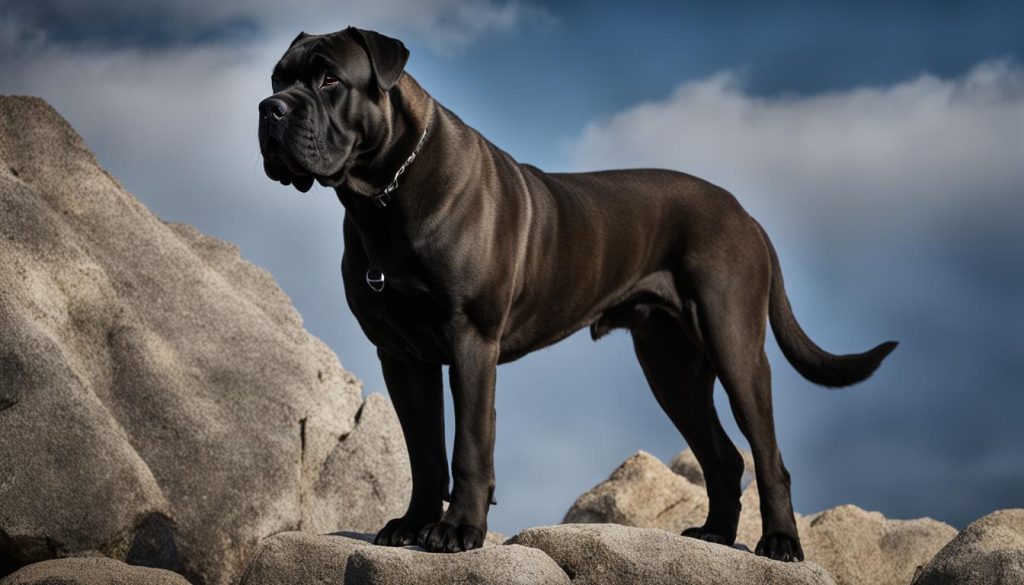
The Cane Corso is a large and powerful dog breed that is known for its natural inclination towards aggression. These dogs are unlikely to be friendly towards strangers, and their imposing size and strength can make them quite intimidating. Proper training and socialization are crucial to manage their aggressive tendencies and ensure they can coexist peacefully in a domestic setting.
It is important to note that the Cane Corso’s aggressive behavior is not inherently malicious but rather a result of their protective instincts and dominant nature. However, without proper handling and guidance, their protective instincts can manifest as unwarranted aggression towards perceived threats or unfamiliar individuals.
Owners of Cane Corsos must prioritize early socialization and obedience training to establish boundaries and teach the dog appropriate behavior. These dogs also require consistent leadership and clear communication from their owners to prevent any aggressive tendencies from escalating. Providing mental stimulation and ample physical exercise is also essential to channel their energy in positive ways and reduce the likelihood of aggressive behavior.
| Key Characteristics | Aggressive Behavior Management Tips |
|---|---|
| Large and powerful | Early socialization to different people and environments |
| Natural protective instinct | Consistent obedience training |
| Dominant nature | Clear communication and leadership from the owner |
| Unfriendliness towards strangers | Ample mental stimulation and physical exercise |
It is important to note that while the Cane Corso may have aggressive tendencies, it is not necessarily the breed’s defining characteristic. With proper training, socialization, and responsible ownership, Cane Corsos can be loving and loyal companions.
Understanding the unique characteristics and potential for aggression in dog breeds like the Cane Corso is crucial for owners and potential dog owners alike. By equipping ourselves with knowledge and taking proactive measures to manage aggression, we can create safe and harmonious environments for both humans and dogs.
Doberman Pinschers – Intelligent and Energetic Guard Dogs
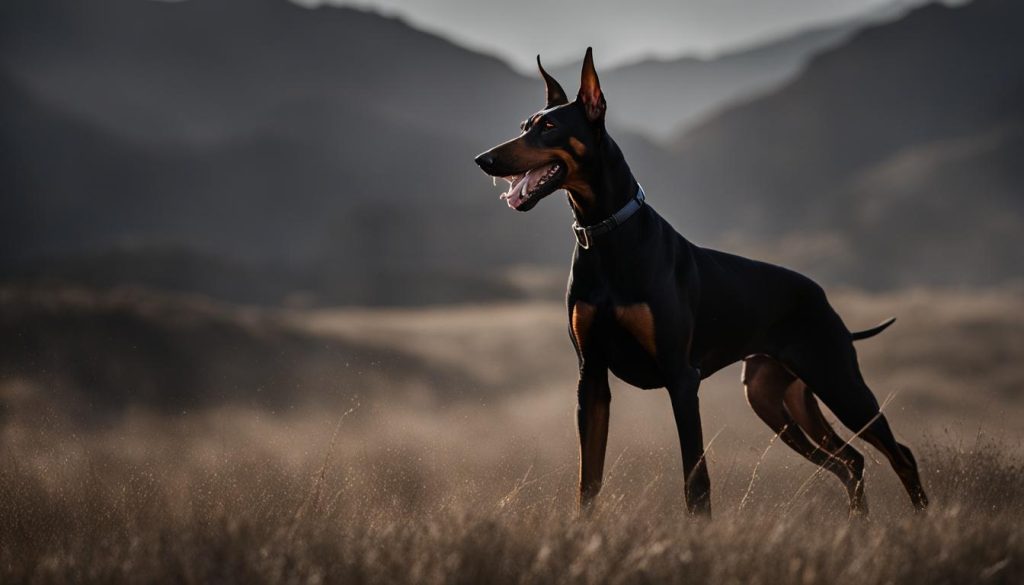
When it comes to aggressive dog breeds, Doberman Pinschers are often mentioned as they possess a combination of intelligence and energy that can sometimes manifest as aggressive behavior. These dogs are known for their loyalty and protective nature, making them popular choices as guard dogs. However, responsible ownership and proper training are essential to prevent any potential aggression from escalating.
Doberman Pinschers are highly intelligent and require mental stimulation to keep them engaged and prevent boredom, which can lead to destructive behavior. Without proper training and socialization from an early age, these dogs may exhibit reactive and aggressive tendencies when faced with unfamiliar situations or individuals.
To ensure the well-being and manageable behavior of Doberman Pinschers, it’s crucial for owners to provide them with structured training sessions, regular exercise, and socialization opportunities. This includes exposing them to different environments, people, and other animals in a controlled manner to teach them appropriate behavior and minimize any potential aggressive reactions.
Please be aware that aggression can be addressed and modified through positive reinforcement training methods. Seeking assistance from a professional dog trainer or behaviorist can be highly beneficial in understanding and managing any aggression-related issues that may arise with Doberman Pinschers. With the right approach, these dogs can be loving, loyal companions while still maintaining their natural protective instincts.
Notable Traits of Doberman Pinschers:
- Intelligent and quick to learn
- Energetic and requires regular exercise
- Protective and loyal to their owners
- Potential for aggression if not properly trained and socialized
Aggression Prevention Tips for Doberman Pinschers:
- Start training and socialization from a young age
- Provide mental stimulation to avoid boredom
- Use positive reinforcement techniques to reinforce desired behaviors
- Ensure regular exercise to burn off excess energy
- Seek professional assistance if aggression issues arise
By understanding the unique traits and needs of Doberman Pinschers, dog owners can effectively manage any potential aggressive tendencies and ensure a happy and healthy relationship with their furry companions.
| Characteristics | Doberman Pinschers |
|---|---|
| Size | Large |
| Temperament | Intelligent, Alert, Energetic |
| Activity Level | High |
| Trainability | Highly trainable |
| Guarding Instinct | Strong |
| Potential for Aggression | If not properly trained and socialized |
German Shepherds – Protective and Intimidating Working Dogs
German Shepherds are widely recognized as one of the most versatile and intelligent dog breeds. With their strong and muscular build, they are often used as working dogs in various roles such as police, search and rescue, and service dogs. However, their protective nature and size can also make them potentially aggressive if not properly trained and socialized.
When it comes to aggressive dog breeds, German Shepherds are frequently mentioned due to their protective instincts. They have a natural inclination to guard and protect their family and territory. This characteristic, combined with their imposing presence, can be intimidating to strangers and may lead to aggressive behavior if not handled carefully.
It is essential for owners of German Shepherds to invest time and effort into training and socialization from an early age. Properly socialized German Shepherds can distinguish between normal situations and real threats, reducing the likelihood of inappropriate aggression. By exposing them to a variety of people, animals, and environments, they can learn appropriate behavior and become well-rounded companions.
However, it is crucial to note that not all German Shepherds are aggressive. Each dog is an individual, and genetics, upbringing, and environment play significant roles in their behavior. While German Shepherds have a reputation for being protective, many well-trained and properly socialized German Shepherds are gentle and friendly with strangers.
FAQ
Do all Chihuahuas exhibit aggressive behavior?
While not all Chihuahuas are aggressive, they can display aggression towards strangers due to their loyalty and protective nature. Proper training and socialization are necessary to manage their behavior.
Are Dachshunds naturally aggressive?
Dachshunds are known for being stubborn and feisty, which can contribute to aggressive behavior. Providing them with proper training and mental stimulation is important to prevent aggression.
Are Chow Chows prone to aggression?
Yes, Chow Chows have dominant personalities and a sturdy build, which can be associated with aggression. Early training and a firm hand are necessary to manage their aggressive tendencies.
Are Akitas aggressive towards strangers?
Akitas have a natural protective instinct and can be wary of strangers. Without proper training and socialization, their guarding behavior can lead to aggression. Experienced handling is required to manage their aggressive tendencies.
Are American Pitbull Terriers aggressive by nature?
American Pitbull Terriers have a tenacious and determined nature, which can sometimes result in aggressive behavior, particularly in fights. However, with proper training and socialization, they can be loving and affectionate pets.
Do Cane Corsos have a friendly temperament?
No, Cane Corsos are large and powerful dogs with a natural tendency towards aggression. They are unlikely to be friendly towards strangers, making proper training and socialization crucial.
Are Doberman Pinschers prone to aggression?
Doberman Pinschers are highly intelligent and energetic. They are often used as guard dogs and can exhibit aggression towards strangers if not properly trained. Responsible handling and training are necessary to mitigate their potential for aggression.
Do German Shepherds make good family pets?
German Shepherds have a reputation for being protective and intimidating due to their size and appearance. They are commonly used in various working roles, which require proper training and socialization to mitigate their potential for aggression. With appropriate training and handling, they can be loyal and loving family pets.


